|
|
|
Sort Order |
|
|
|
Items / Page
|
|
|
|
|
|
|
| Srl | Item |
| 1 |
ID:
086654
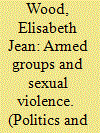

|
|
|
|
|
| Publication |
2009.
|
| Summary/Abstract |
This article explores a particular pattern of wartime violence, the relative absence of sexual violence on the part of many armed groups. This neglected fact has important policy implications: If some groups do not engage in sexual violence, then rape is not inevitable in war as is sometimes claimed, and there are stronger grounds for holding responsible those groups that do engage in sexual violence. After developing a theoretical framework for understanding the observed variation in wartime sexual violence, the article analyzes the puzzling absence of sexual violence on the part of the secessionist Liberation Tigers of Tamil Eelam of Sri Lanka.
|
|
|
|
|
|
|
|
|
|
|
|
|
|
|
|
| 2 |
ID:
155544


|
|
|
|
|
| Summary/Abstract |
Chelsea Szendi Schieder, a political scientist at Tokyo’s Meiji University, describes how, in the wake of Japan’s triple disaster (earthquake, tsunami, and nuclear meltdown), the country has moved to fortify national harmony and women’s place in the traditional family unit. But Schieder writes that, for women struggling to extricate themselves from violent households, these “bonds that link families become bondage.” She discusses how policies under Shinzô Abe, including a proposed constitutional revision, seek to strengthen the neoliberal order at the expense of women.
|
|
|
|
|
|
|
|
|
|
|
|
|
|
|
|
| 3 |
ID:
194487


|
|
|
|
|
| Summary/Abstract |
The degree to which female political actors influence policy is hotly debated in political science. However, relatively little research considers how women’s representation in the police influences policing outcomes. We argue that increasing women’s representation should be associated with increases in rape report rates but should not be associated with changes in rape arrest rates. We expect public perceptions of female police to affect victims’ willingness to report and cooperate with the police, but the masculine, hierarchical, and complex nature of police investigations of rape will make it difficult for those increases in reporting to translate into increases in arrests for those crimes. We leverage unique police administrative data from 1987 to 2016 and find that although women’s representation is associated with increased rape report rates, there is no relationship with rape arrest rates, highlighting an important justice gap. Our article has implications not only for the study of female representation and representative bureaucracy but also provides insights into how descriptive representation may be limited by institutional culture, norms, practices, and procedures.
|
|
|
|
|
|
|
|
|
|
|
|
|
|
|
|
| 4 |
ID:
086650
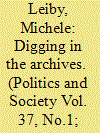

|
|
|
|
|
| Publication |
2009.
|
| Summary/Abstract |
This article explores the methodological obstacles to research on wartime sexual violence and the extent to which they can be overcome with archival research. It discusses issues of concept formation, counting victims of human rights abuse, and coding violations. It compares figures from the Peruvian Truth and Reconciliation Commission's final report, an analysis of the Commission's published materials, and an analysis of the primary documents and finds that (1) the number of reported cases of sexual violence is significantly higher than the 538 cited by the Commission, (2) men were more often the targets of sexual violence than previously thought, and (3) sexual humiliation and sexual torture were common practices during the war
|
|
|
|
|
|
|
|
|
|
|
|
|
|
|
|
| 5 |
ID:
185258
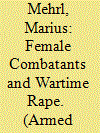

|
|
|
|
|
| Summary/Abstract |
Whereas existing research posits that the presence of female fighters in armed groups decreases their propensity for wartime rape, one recent study tests this claim quantitatively and is unable to detect a statistically significant effect. This leads the author to conclude that female combatants do not decrease rape. Using that study’s original data, this article reexamines the evidence for the relationship between female rebel combatants and wartime sexual violence. Replications of the original models suggest that they make strong functional form assumptions regarding numerous independent variables and time dependence and that relaxing them results in substantively different findings. Namely, women’s participation in armed groups decreases groups’ use of wartime rape. In support of Loken’s organizational theory of rape, results also suggest that this effect is moderated by group norms. These findings contribute to the literature on female participation in rebel groups and beyond.
|
|
|
|
|
|
|
|
|
|
|
|
|
|
|
|
| 6 |
ID:
132354
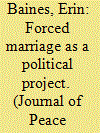

|
|
|
|
|
| Publication |
2014.
|
| Summary/Abstract |
One of the most vexing contradictions about the Uganda originated rebel group, the Lord's Resistance Army (LRA), is the fact that it institutionalized forced marriage on the one hand, while actively discouraging sexually immoral behavior on the other: rape, sexual violence, and promiscuity both within the group and outside it were punishable by severe beating or death. What explains this contradiction? The article suggests that in addition to maintaining discipline and control over a diverse and reluctant group, forced marriage and the regulation of sexual relations reproduced a political project of imagining a 'new Acholi' nation. The article draws on original data collected in focus group discussions with former commanders and wives to commanders to discuss the historical evolution of this vision, how the LRA enforced rules regarding sexual behavior, and finally, the way forced marriage implicated women and girls in the organization of power and domination in the group until it was forced from permanent bases in Sudan in 2002.
|
|
|
|
|
|
|
|
|
|
|
|
|
|
|
|
| 7 |
ID:
104143
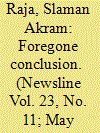

|
|
|
| 8 |
ID:
183718
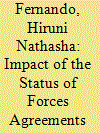

|
|
|
|
|
| Summary/Abstract |
The rise of China and its maritime expansion has threatened the US preponderance in world politics. The Indo-Pacific construct is America’s comeback and its strategy to engage with a rising Asia while countering its adversaries, especially China. Within this larger strategic dynamic, US defence agreements have become a curious subject of scrutiny, especially for small states in South Asia such as Sri Lanka, which is strategically located in the Indo-Pacific region. US defence agreements are manifold and have been signed with many countries in different regions. A vast majority of these, such as the acquisition and cross-services agreements (ACSA) and the status of forces agreements (SOFA), deal with technical matters concerning logistical support, conduct of US troops on foreign soil, and jurisdictional and basing issues. While the SOFA establishes the legal framework under which US armed forces operate in a foreign country, there are certain inherent features that are deemed highly controversial, such as the exercise of criminal jurisdiction, causing chronic and pervasive dangers to human security in host nations. While the United States is a ‘necessary evil’ for strategic hedging to keep Chinese aggressions at bay, the adverse impacts on host states could ultimately hinder US efforts to counter China in the long run. Sri Lanka, in particular, is an aid recipient of both the United States and China. Therefore, Sri Lanka must learn to re-evaluate its international policy carefully to preclude being divested in intense great power rivalry.
|
|
|
|
|
|
|
|
|
|
|
|
|
|
|
|
| 9 |
ID:
155545
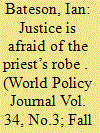

|
|
|
|
|
| Summary/Abstract |
Lucia was 15 when she became pregnant. The news was a shock to her family: Lucia didn’t have a boyfriend and spent her time doing homework and singing in the church choir. But amid tears, the girl revealed to her mother that the local priest had been raping her for the past two years. Journalist Ian Bateson reports on how Nicaragua’s total ban on abortions, backed by President Daniel Ortega, has left girls like Lucia without options, and how a handful of women’s rights groups are fighting back.
|
|
|
|
|
|
|
|
|
|
|
|
|
|
|
|
| 10 |
ID:
137513
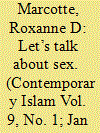

|
|
|
|
|
| Summary/Abstract |
Sex talk is ubiquitous, yet often remains difficult within more conservative or religious milieus. However, online forums provide younger digital native Muslims with novel environments where they can discuss sex-related issues with one another. Listening to the views young Muslims share on online forums can shed some light onto how members of an Australian online virtual community frame and conceive of a number of sex-related issues, the questions they pose, the discussions that ensue, and the answers they contribute. The aim is to explore what forum discussions can tell us about the views, understanding, and framing of sex-related issues with which young Australian Muslims, living in Muslim minority context, are confronted in their own lives, those of their kin, or of members of their communities, while, simultaneously and paradoxically, reiterating an unproblematic normative “Islamic” position. Might online forums foster expressions of more creative indigenous and hybrid gendered discourses, as online forum discussions often remain open-ended? The dynamics of online discussions are explored by looking, first, at sexuality related issues within the confines of marriage and, second, sexuality-related issues outside of its confines
|
|
|
|
|
|
|
|
|
|
|
|
|
|
|
|
| 11 |
ID:
173843
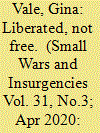

|
|
|
|
|
| Summary/Abstract |
In 2014, the Islamic State (IS) group launched a genocidal campaign against the Yazidis in Northern Iraq. IS used varied means to attack and fragment the Yazidi community: massacre of men; indoctrination and training of young boys; forced conversion of families; and kidnapping, enslavement, and rape of women and girls. Academic and policy attention has predominantly focused on IS’ sexual violence and rape of young Yazidi women and girls. This has led to the accounts of other female captives – namely, older women and undivided families – being overlooked or undervalued, excluding important elements of IS’s broader strategy of persecution. This paper analyses women’s varied experiences of captivity to reveal a fragmented population of female captives and seeks to demonstrates that IS exploited Yazidism’s religious and sociocultural customs to ensure that the impacts of its genocide – for the women themselves and the wider Yazidi community – continue beyond liberation. It concludes that although progress has been made to cope with trauma, displacement, and abuse, the community remains both physically and culturally fragmented.
|
|
|
|
|
|
|
|
|
|
|
|
|
|
|
|
| 12 |
ID:
093096
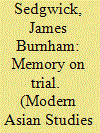

|
|
|
|
|
| Publication |
2009.
|
| Summary/Abstract |
The spectre of the 1937 'Rape of Nanking' continues to haunt China and Japan. Sixty years ago in Tokyo, the International Military Tribunal for the Far East (IMTFE) announced its definitive 'judgement' of what happened in Nanking. This judgement purported to be intractable. The legal process used to reach it produced a disputed picture instead. The resulting narrative confusion continues to inform how memory of Nanjing is shaped, used and contested. This paper explores the construction of 'Rape of Nanking' narratives at the IMTFE. By demonstrating the inherently contested nature of narratives produced by adversarial legal proceedings, it argues that using courts as a panacea for postwar restoration and as validators of traumatic narratives is both short-sighted and ineffective. The IMTFE exemplifies the inadequacy of trial-based post-conflict reconciliation. It is hoped that the lessons learned from Tokyo's limitations will benefit the ongoing quest for tenable models of international justice.
|
|
|
|
|
|
|
|
|
|
|
|
|
|
|
|
| 13 |
ID:
126213
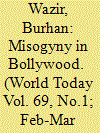

|
|
|
|
|
| Publication |
2013.
|
| Summary/Abstract |
The rape and killing of a student had led to criticism of the portrayal of women in films.
|
|
|
|
|
|
|
|
|
|
|
|
|
|
|
|
| 14 |
ID:
186869


|
|
|
|
|
| Summary/Abstract |
Scholars increasingly call for documentation and analysis of specific forms of conflict-related sexual violence. Moreover, accountability for crimes is stronger when specific patterns of victimization are documented. This article introduces the Repertoires of Sexual Violence in Armed Conflict (RSVAC) data package, which assembles reports from 1989 to 2015 of forms of sexual violence by government/states forces, insurgent/rebel organizations, and pro-government militias for each conflict and year. RSVAC compiles the reported prevalence of eight forms of sexual violence – rape, sexual slavery and forced marriage, forced prostitution, sexual mutilation, forced pregnancy, forced sterilization and abortion, non-penetrative sexual torture, and sexual abuse (as well as that of multiple-perpetrator reports of each form). It includes extensive qualitative notes on reported incidents, as well as ‘conflict manuscripts’ that include the relevant portions of source documents. Disaggregating ‘sexual violence’ into its distinct forms enables analysis of the reported presence of forms of sexual violence across time, conflicts, and organizations. We illustrate its usefulness by highlighting hitherto neglected global patterns it suggests, and also discuss limitations, potential biases and underreporting that users need to take into account. We outline several research questions that the data can help answer and suggest how the data package could inform policy efforts to address sexual violence and its consequences.
|
|
|
|
|
|
|
|
|
|
|
|
|
|
|
|
| 15 |
ID:
132356
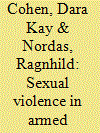

|
|
|
|
|
| Publication |
2014.
|
| Summary/Abstract |
Which armed groups have perpetrated sexual violence in recent conflicts? This article presents patterns from the new Sexual Violence in Armed Conflict (SVAC) dataset. The dataset, coded from the three most widely used sources in the quantitative human rights literature, covers 129 active conflicts, and the 625 armed actors involved in these conflicts, during the period 1989-2009. The unit of observation is the conflict-actor-year, allowing for detailed analysis of the patterns of perpetration of sexual violence for each conflict actor. The dataset captures six dimensions of sexual violence: prevalence, perpetrators, victims, forms, location, and timing. In addition to active conflict-years, the dataset also includes reports of sexual violence committed by conflict actors in the five years post-conflict. We use the data to trace variation in reported conflict-related sexual violence over time, space, and actor type, and outline the dataset's potential utility for scholars. Among the insights offered are that the prevalence of sexual violence varies dramatically by perpetrator group, suggesting that sexual violations are common - but not ubiquitous. In addition, we find that state militaries are more likely to be reported as perpetrators of sexual violence than either rebel groups or militias. Finally, reports of sexual violence continue into the post-conflict period, sometimes at very high levels. The data may be helpful both to scholars and policymakers for better understanding the patterns of sexual violence, its causes, and its consequences.
|
|
|
|
|
|
|
|
|
|
|
|
|
|
|
|
| 16 |
ID:
086649
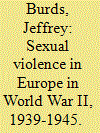

|
|
|
|
|
| Publication |
2009.
|
| Summary/Abstract |
Focusing in particular on the German-Soviet war in the East, this article explores variations in patterns of sexual violence associated with armed forces in Europe during and immediately after World War II. Besides soldier violence perpetrated against civilian populations, a significant role was also played by irregular forces: most notably, by partisan guerrillas and civilian vigilantes. Ethnic nationalist partisan forces perpetrated especially brutal sexual violence against women and girls of "enemy" nationalities. Likewise, after liberation civilian reprisals were fairly common throughout Europe against so-called "sexual collaborators"-that is, against women excoriated for providing "sexual comfort" to the enemy during the German occupation.
|
|
|
|
|
|
|
|
|
|
|
|
|
|
|
|
| 17 |
ID:
145460
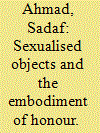

|
|
|
|
|
| Summary/Abstract |
A number of popular Pakistani films feature rapes and attempted rapes, supporting a rape culture that needs to be problematised. I analyse these films and demonstrate that this gendered form of violence serves multiple functions, providing the audience with gratuitous entertainment, developing the narrative and/or punishing women. These functions, which are by no means unique to Pakistani film, incite, excuse and normalise sexual aggression, so supporting a strong rape culture. I also draw attention to more culturally specific honour-based ideologies in these films and demonstrate how these can also encourage and legitimise rape. This leads to a more holistic understanding of what this local rape culture entails. I show that the mainstream film industry has consistently portrayed this culture and suggest that filmmakers’ allegiance to such narratives has therefore amplified the promotion and reproduction of a rape culture in Pakistani society.
|
|
|
|
|
|
|
|
|
|
|
|
|
|
|
|
| 18 |
ID:
155202
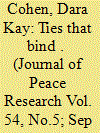

|
|
|
|
|
| Summary/Abstract |
How do armed groups use violence to create social ties? What are the conditions under which such violence takes place? In this article, I describe how armed groups use one type of atrocity, wartime rape, to create social bonds between fighters through a process of combatant socialization. As a form of stigmatizing, public, and sexualized violence, gang rape is an effective method to communicate norms of masculinity, virility, brutality, and loyalty between fighters. Drawing on literature about socialization processes, I derive a set of hypotheses about individual-level factors that may influence vulnerability to violent socialization, including age, previous socialization experiences, and physical security. I analyze the support for these hypotheses using newly available survey data from former fighters in the Democratic Republic of the Congo. The results show the broad applicability of considering group violence as a form of social control within armed groups, suggest some of the limits of violent socialization, and have implications for both theory and policy.
|
|
|
|
|
|
|
|
|
|
|
|
|
|
|
|
| 19 |
ID:
192060
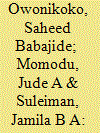

|
|
|
|
|
| Summary/Abstract |
Sexual violence cases in Adamawa State have been frequently reported. Yet, the interrogation of the phenomenon has not received adequate scholarly attention. Unfortunately, unusual high incidents of rape were recorded in the state in 2020 prompting an examination of the trend and pattern of incidents of rape in the state. Data were collected from police records of incidents of rape and interviews were granted to perpetrators, police officers and parents/guardians of victims. The study shows that the highest cases of rape were recorded in July, and Yola North Local Government Area of the state recorded the highest number of incidents of rape. All the perpetrators are male whose ages are within the range of 18 and 33 years while the majority of the victims are female, mostly minors. Covid-19 outbreak and the containment mechanisms employed in the state were the major factors in the escalation of rape cases. The lockdown policy of the state created situations like loss of jobs, dwindling economic resources and shut-down of state apparatuses of security especially the police which increased motivations for offenders to commit the crime of rape as well as contributed to the vulnerability of the victims of rape.
|
|
|
|
|
|
|
|
|
|
|
|
|
|
|
|
| 20 |
ID:
166893
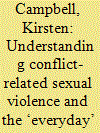

|
|
|
|
|
| Summary/Abstract |
The testimonies of witnesses who testify before criminal courts provide crucial insights into the situated experience of conflict-related sexual violence. Witness testimonies highlight the complex realities and everyday lives of individuals caught up in situations of armed conflict. The evidence presented by witnesses can provide vital insights into lived experiences of wartime violence, and reveal the seemingly mundane strategies and tactics adopted by victims to cope with, survive and resist the violent and coercive circumstances of war. This article foregrounds conflict-related sexual violence witness testimonies as highly significant sources of knowledge of everyday experiences of conflict. It sets out a bottom-up, mixed-method approach for identifying and analysing the experiential accounts of those who lived through conflict-related sexual violence, while engaging with the opportunities and challenges of using witness testimony. Our approach unsettles existing notions of ‘the everyday’ in Peace & Conflict Studies as a synonym for narratives and practices of violence, justice and peacebuilding that are private, informal and largely hidden from view. Understanding witness testimonies requires conceptualising the everyday as an amalgam of formal and informal practices, as accessible through both elite and lay knowledges and as documented in both public and private (e.g. redacted) sources. It requires challenging taken-for-granted dichotomies that are frequently invoked to understand conflict and peace.
|
|
|
|
|
|
|
|
|
|
|
|
|
|
|
|
|
|
|
|
|